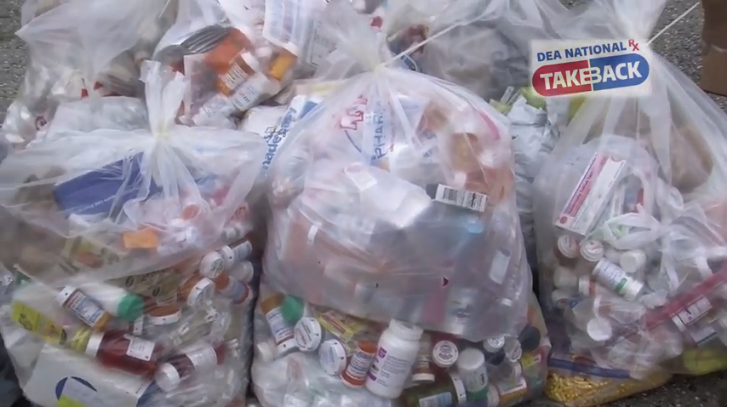
Saturday is the Drug Enforcement Administration’s 18th National Prescription Drug Take Back Day.
“Most of us have a loaded gun with a hair-trigger with no safety in our medicine cabinets in our homes…and most of us don’t even realize it,” one U.S Attorney said. “Let’s do our part to protect our loved ones by getting rid of those prescription drugs in our possession that we no longer need. Not only does this make us all safer, it raises awareness to the dangers of prescription drug abuse, opioid addiction, and shines a bright light on the new threat of counterfeit pills hitting the streets.”
Now in its tenth year, DEA has collected a total of more than 11 million pounds (almost 6,000 tons) of expired, unused and unwanted prescription medications through its Take Back Day events. As of October 21, more than 5,250 collection sites manned by more than 4,500 registered law enforcement partners will be open from 10:00 a.m. to 2 p.m. local time. The public can find a nearby collection site at www.DEATakeBack.com or by calling 800-882-9539. This service is free and anonymous.
For the first time, DEA will now accept vaping devices and cartridges – in addition to tablets, capsules, patches and other medications in solid forms – at any of its drop off locations. DEA is doing all it can to help dispose safely of vaping devices and liquids to get these products off our street and out of the hands of children. It is important to note that DEA cannot accept devices containing lithium ion batteries. If batteries cannot be removed prior to drop-off, DEA encourages individuals to consult with stores that recycle lithium ion batteries.
The National Prescription Drug Take Back Day Initiative addresses a vital public safety and public health issue. Medicines that languish in home cabinets are highly susceptible to diversion, misuse and abuse. The rate of prescription drug abuse in the United States is alarmingly high, as are the number of accidental poisonings and overdoses due to these drugs.
National Take Back Day has received robust public support since its inception in 2010. Last April, the public turned in 469 tons (937,443 pounds) of prescription drugs at more than 6,258 sites operated by the DEA and its 4,969 local and tribal partners.


Chattooga Opinions
The Joy of the Journey: More Than a Conqueror

Bulloch Public Safety
02/06/2026 Booking Report for Bulloch County

Bulloch Public Safety
02/05/2026 Booking Report for Bulloch County

Chattooga Local News
Carr Takes New Action to Prosecute Fulton County Domestic Terrorism Case

Bulloch Public Safety
01/20/2026 Booking Report for Bulloch County

Bulloch Public Safety
01/12/2026 Booking Report for Bulloch County

Bulloch Public Safety
01/26/2026 Booking Report for Bulloch County

Bulloch Public Safety
01/22/2026 Booking Report for Bulloch County

Bulloch Public Safety
01/16/2026 Booking Report for Bulloch County





